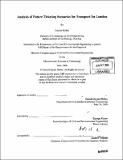Analysis of future ticketing scenarios for transport for London
Author(s)
Mehta, Saumil (Saumil Jayant)
DownloadFull printable version (7.818Mb)
Other Contributors
Massachusetts Institute of Technology. Dept. of Civil and Environmental Engineering.
Advisor
George Kocur.
Terms of use
Metadata
Show full item recordAbstract
Rapid advances in information and communications technology in the recent past have opened up new possibilities for ticketing in public transit systems. These systems offer several benefits like replacing cash, deployment of a richer fare structure and minimizing queuing times. Although smart card ticketing systems have existed for several years now, the full potential of the developments in information technology have yet to be leveraged in terms of cost effectiveness and diverse fare collection strategies. In 2002, TfL (Transport for London) has introduced the Oyster card as a means of smart card ticketing. However TfL has the option to extend or possibly depart from the Oyster Card system in the years 2010 or 2015, when the existing contractual agreements for are open to change. With the aim of understanding the future requirements of ticketing systems, TfL wants to explore ticketing policy and technology options that would be effective and feasible over the next 5 to 10 years. The study results will then guide the development of hardware and software concepts to support such systems. We have proposed seven options for future ticketing systems, which can be broadly categorized into seven categories based on their principal technologies used. (cont.) The present work is aimed at guiding TfL to specify the system requirements of the future technology that will best suit the needs of TfL and its customers. A software model has been developed to analyze the effectiveness of the several possible alternatives by estimating their costs and the potential revenues that each of them can generate. The system costs and revenues that can be generated highly depend upon the fare structure used for pricing tickets which in turn depend on the ticketing media, organization that handles the transactions and type of technology used for fare collection. Another goal of the project is to estimate the transaction times required to validate tickets and possibly use real time pricing by performing simulations using the Java card environment. The analysis will help in understanding the hardware requirements and physical properties of the card.
Description
Thesis (M. Eng.)--Massachusetts Institute of Technology, Dept. of Civil and Environmental Engineering, 2006. "June 2006." Includes bibliographical references (p. 71).
Date issued
2006Department
Massachusetts Institute of Technology. Department of Civil and Environmental EngineeringPublisher
Massachusetts Institute of Technology
Keywords
Civil and Environmental Engineering.